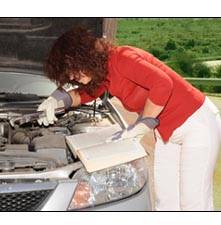The repair shop rip-off takes a new twist as insurers cut costs by openening their own car repair businesseses.
Insurance companies have started buying or investing in car repair businesses about three years ago. Insurance companies owning a car repair facilities can result in the consumer receiving bad service and inferior replacement parts. Many people in the auto repair industry have complained they are pressured by the insurance companies that own them to keep costs down, and if they don’t, they risk losing referred business.
Know your rights!
Car owners have rights when getting their car repaired after a collision, but it applies to routine maintenance repairs too.
The Automobile Service Association (ASA) suggests car owners ask insurance companies the following questions when looking for a repair shop after a collision:

Do I have to obtain three estimates?
This is an old practice; you don’t have to obtain three estimates. This was a practice, not a requirement, which put the onus on the consumer to get the lowest price.
May I choose any repair shop?
Yes, you can choose any repair shop you wish, and any attempt to direct you to a particular shop should be viewed skeptically. Often, a new car dealer won’t have a collision repair shop so they’ll send you to one they have a contract with. It’s not a requirement that they have a collision repair shop.
How can I be sure that they are going to repair my vehicle with quality parts?
The insurance company is required to disclose any parts used other than OEM car parts. The car owner is supposed to agree if the insurance company says it will use other market parts, rather than have those parts forced on them. In some states, however, there are no regulations that require this.
According to the Automotive Service Association, the following cheap and easy tips are recommended for maintaining your car:
- Refer to your owner’s manual first; however, general guidelines indicate regular changing of your oil filter, every 3,000 to 4,000 miles.
- Regularly check all fluids, including antifreeze, brake, power steering, transmission/transaxle and windshield washer cleaner. These fluids play a significant part in the performance and safety of your car.
- Maintain correct tire inflation by checking them at least once a month. Improperly inflated tires can cause a loss in fuel efficiency.
- Regular engine tune ups are crucial. Fuel efficiency can be lowered by as much as 30% by a ruined spark plug or blocked fuel injector.
- To lengthen the life of the moving parts of your car’s suspension system, arrange for regular lubrication of the chassis.
- Make sure battery cables and posts don’t have any corrosion. If you spot some, clean it off and make sure it’s done on a regular basis. Except in the case of maintenance free batteries, the battery fluid should also be inspected and filled if low.
- Test your car’s lighting system often, consisting of headlights, turn signals, and brake and tail lights.
Inspect windshield washer blades for cracks, tears and how well they contact the windshield. If Streaking begins, replace them immediately, at least once a year.
- Regularly review by sight all of your vehicle’s engine belts. When looking at them, check for cracks and parts of the belt that may be missing. Your car’s engine performance can be affected by belts that are worn.
- To ensure peak condition, check your auto’s air filtration system every other time you have your oil changed. Clogged or damaged air filters will bring your car’s performance down.
- Always consult the vehicle owner’s manual for individual service schedules as manufacturer maintenance requirements vary greatly.
